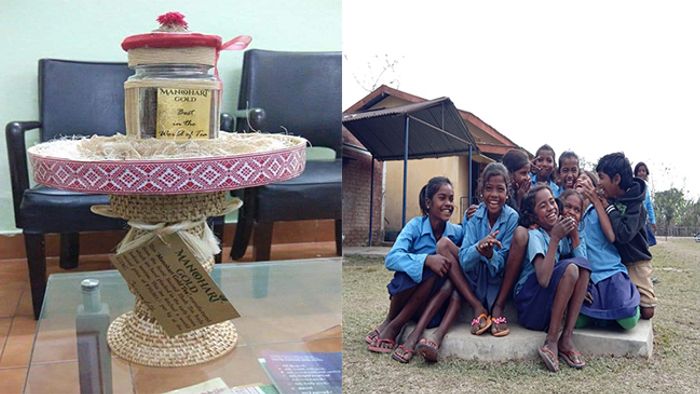The Manohari Gold: An Endoscopic View.

- May 25, 2019,
- Updated May 25, 2019, 1:43 AM IST
By: DEEPKAMAL BORAH
“Every one of us has our own problems and no matter what we have to face those. My friends could help me through but I still need to face those and sail across.”
Mr. Rakesh Mishra
Manager, Manohari Tea Estate
Manohari Gold, a speciality tea produced in the Manohari Tea Estate in Assam’s Dibrugarh district is currently the most expensive tea. It scored a record-breaking sum of Rs. 39,001 per kg at an auction in Guwahati Tea Auction Centre on 24th July 2018.
The heat waves and the varying rainfall over the years have poised themselves as serious threats to the production capacity of the region while escalating the dependency on ‘Bought Leaves’ from the Small Tea Growers. The milestone thus achieved by this 24-carat gold look-alike strain has marked a new dawn in the tea industry of the region with a promising prospect for socio-economic development.
Manohari Tea Estate – Plantation Field
However, it proves to be a tremendous epiphany with the burden of maternal mortality and infant mortality. Assam accounts for almost 182% more maternal deaths than that of the national average (130) and the data is staggering high in the tea plantation areas. The major contributing factors identified to morbidity resulting in high maternal and infant death include poor nutritional status among the tea tribe population, anaemia, hypertension, malnutrition, and diarrhoeal diseases. The lack of proper sanitation facilities, hygiene practices and access to safe drinking water are the critical gaps identified in the worker’s residential lines.
Manohari Tea Estate- Entrance
In 2016, the takeover of the estate by the Kolkata based Suntok Tea Co.Llp brought an end to the five years of the predicament faced by the community in the form of food supplies, wage revisions and renovation of housing facilities. The effective decision making of the management was able to stabilize the need of that hour enabling them to plan and act towards a superior quality of their produce. Moreover, the role of the governmental policies and interventions in terms of the market, labor laws and human development has been pragmatic enough to support the vision of the management through structural functioning of the government at all different levels streamlined through District Administration and Public Health Engineering Departments (PHED).
Source: SBM(G) Dibrugarh
Under the Swachh Bharat Mission Gramin- SBM (G), a total number of 1239 sanitary toilets have been constructed in the tea estate by PHED (Dibrugarh) from 2014 to 2018. The role of the behavioural change campaigns has confirmed to be effective in delivering the intended messages regarding proper sanitation and hygienic living fueling the rate of acceptance to such behaviour change.
A waste management project was also set up in the Tea Estate under the Solid and Liquid Waste Management (SLWM) component of SBM (G). The foundation stone of the Vermi Composting Unit was laid by Dr. Siddharth Singh (IAS), Mission Director, SBM (G). This initiative highlights the importance of sustainable cultivation which showcases the concerns regarding the hazardous effects of pesticide use on the soil, plants and human health. Moreover, the increasing demand for organically cultivated tea strains both in the local and the international market provides scope for economic prosperity among the community.
Mr. Birju Urang, one of the few educated youths is the newly elected Ward Member of Manohari Tea Estate. He acknowledges the contributions of the new management towards the social and economic well being of the community at large. According to him, the infrastructural development of the toilet facilities successfully curbs the rate of open defecation in their community. It neutralizes the women’s safety concerns in the wild and the disease burden too. He firmly believes that the productivity and quality of a tea estate produce depend upon the health of the working group, which can only be achieved by a healthy way of living. The need for a full-time residential doctor in the estate has been long anticipated, he added.
Mrs. Saindhya Nayak, President (Manohari Tea Estate Mothers Club) is an active member on the ground level. She along with the other members work on family planning, domestic violence, nutrition, hygienic and healthy living, and children’s health. According to her, the orientation they receive by means of ICTs and Focus Group Discussions (FGD) on children’s education and their health has enabled them to decide things for themselves, and act along for the well being of the whole community. When asked about the Maternal Benefit Act (2017), Mrs. Nayak was pretty optimistic regarding such a policy move. She added that the Adolescent Girls Club created in 2018 has been effective in generating awareness on menstrual hygiene, child sex abuse and teenage pregnancy among the adolescent girls.
The hand-washing practice before food and after toilet use has been well adopted by the primary school students of Manohari. Mr. Rajib Kumar Buragohain (Headmaster) is vigilant in terms of hygiene practices among his students. According to him, the recognition of such a hygienic and healthy way of living at an early age would enable the children to carry a better quality of life in the future.
The luxury of the Manohari Gold is not accidental. It was made with utmost dedication and humongous efforts with inherent quality and special clones of tea bushes, hand plucked in the mist of early dawns. This golden milestone rests on top of thriving management and a healthy workforce both adapting through transitions into a paradigm of quality life and quality products. The dependency thus countering on either side of the scale demands better education and healthcare facilities alongside timely interventions in order to achieve long term development goals.